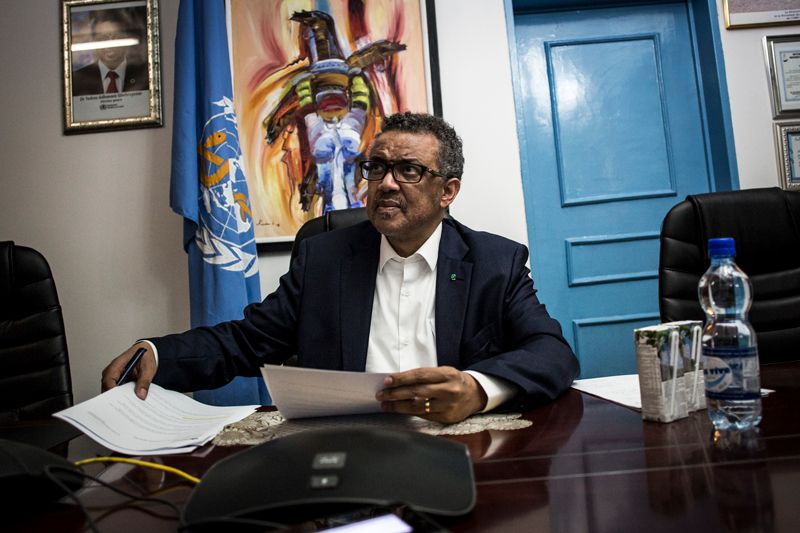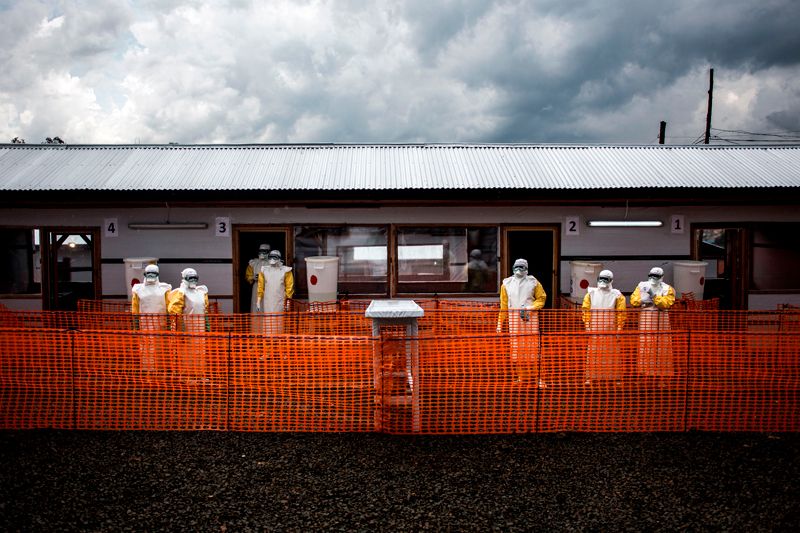
This story was supported by the Pulitzer Center on Crisis Reporting.
Kinshasa, Democratic Republic of the Congo
The Ebola outbreak that has ravaged the northeast Democratic Republic of the Congo (DRC) — now the second largest on record — spread into neighbouring Uganda this week, raising concerns about whether health officials can contain the virus. But the crisis still does not warrant the World Health Organization’s (WHO) highest level of alarm, agency director Tedros Adhanom Ghebreyesus said on 14 June.
“Although the spread of Ebola to Uganda is tragic, it is not a surprise,” Ghebreyesus told reporters, speaking from the WHO’s offices in Kinshasa, the DRC’s capital. “Since the beginning of the outbreak, we have said that the risk of spread across the border is high, and it remains high.” But “the fundamental dynamic” of the outbreak has not changed, he said.
More than 2,100 people have been infected with the virus since the outbreak began in August 2018, and roughly 1,400 had died as of 12 June, according to the WHO. These figures include the first Ebola fatalities in Uganda during this outbreak: a five-year-old boy and his grandmother, who died earlier this week.
The WHO’s announcement marks the third time since the outbreak began that the agency has decided against declaring a public-health emergency of international concern (PHEIC).
The handful of Ebola cases confirmed in Uganda have involved people who travelled from the DRC, and there is no evidence that the virus is being transmitted within Uganda. One criteria that the WHO uses to determine whether an outbreak is a global emergency is whether a disease is spreading in more than one country.
The WHO’s Emergency Committee of independent medical experts also decided against declaring an emergency in part over concerns that doing so could trigger the DRC’s neighbours to close their borders. That could in turn halt trade, damaging the DRC’s economy, and prevent thousands of people from escaping violence in the northeastern DRC, which is home to dozens of armed groups.
At least 50 people were killed during a recent surge of violence in Ituri, one of two northeast DRC provinces in which Ebola is spreading, the DRC government said on 13 June.
Difficult decisions
“This issue of PHEIC and not PHEIC — I think we are carried away by the term,” says Chikwe Ihekweazu, the director-general of the Nigeria Centre for Disease Control in Abuja, who advised the WHO’s Emergency Committee during its latest deliberations. “Of course it is an emergency of international concern, translated literally, but making this additional declaration — to be honest, I don't see the extra benefit it would bring.”
Oly Ilunga Kalenga, the DRC’s minister of health, agrees. “From my point of view, there is no need for a PHEIC,” he says. About 25,000 people per day travel through 80 entry points that connect the DRC’s North Kivu and Ituri provinces with Uganda. But only a handful of people with Ebola have managed to cross from the DRC to Uganda, he notes.
What makes this outbreak difficult, Kalenga says, is the roiling violence and distrust of government in areas of the DRC where the virus is spreading. “I compare this outbreak to a monster with many heads,” he says. “You cut off one head and another appears. You have to respond to the face in front of you.”

Other experts argue that declaring an emergency is needed to bring the current Ebola outbreak under control. “I'm baffled. I'm actually bewildered. I simply don't understand the reasoning,” says Lawrence Gostin, a health-law and policy specialist at Georgetown University in Washington DC. “The WHO was roundly criticized for delaying for six months its declaration of an emergency in West Africa, and now it’s repeating history.”
Gostin had hoped that an emergency declaration for the DRC outbreak would prompt an outpouring of financial help and other assistance from governments and aid organizations — similar to that seen during the 2014–2016 Ebola outbreak in West Africa, when donors contributed an estimated US$3 billion to fight the virus. The WHO has said that it needs at least another $54 million in donations to support its Ebola response through July.
But Ghebreyesus says that the declaration of a public-health emergency should not be viewed as a fundraising exercise. “Resources should be mobilized before you sound the alarm, you don't wait to patch the roof until after the storm comes,” he told Nature. “Using a PHEIC to mobilize resources is dangerous because by then, it's too late.”
doi: 10.1038/d41586-019-01893-1